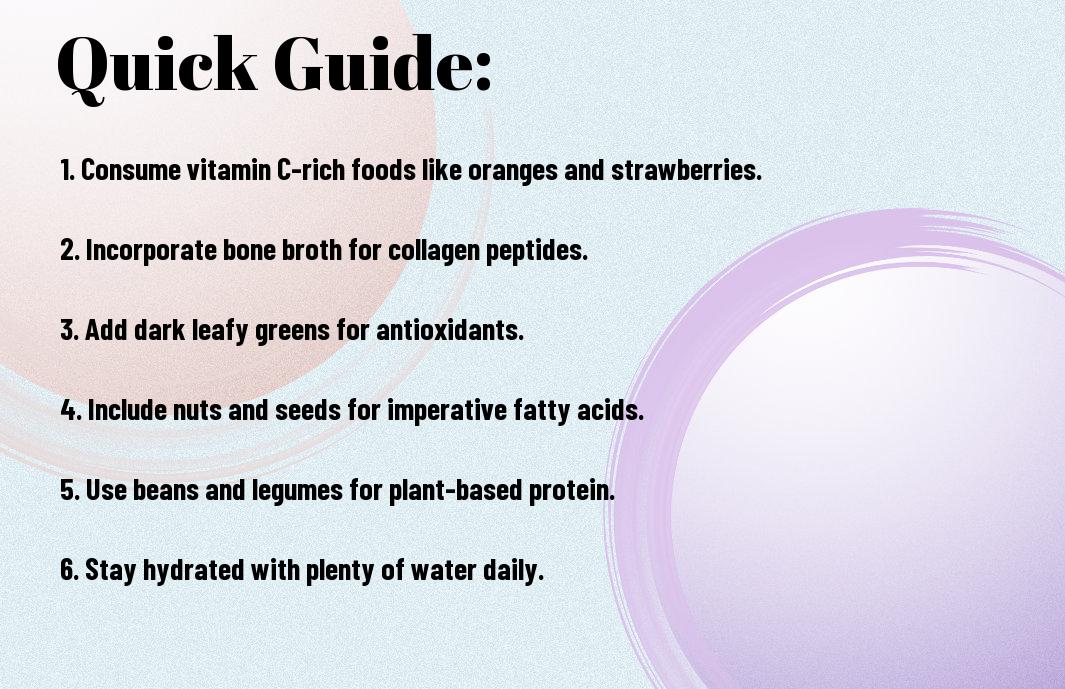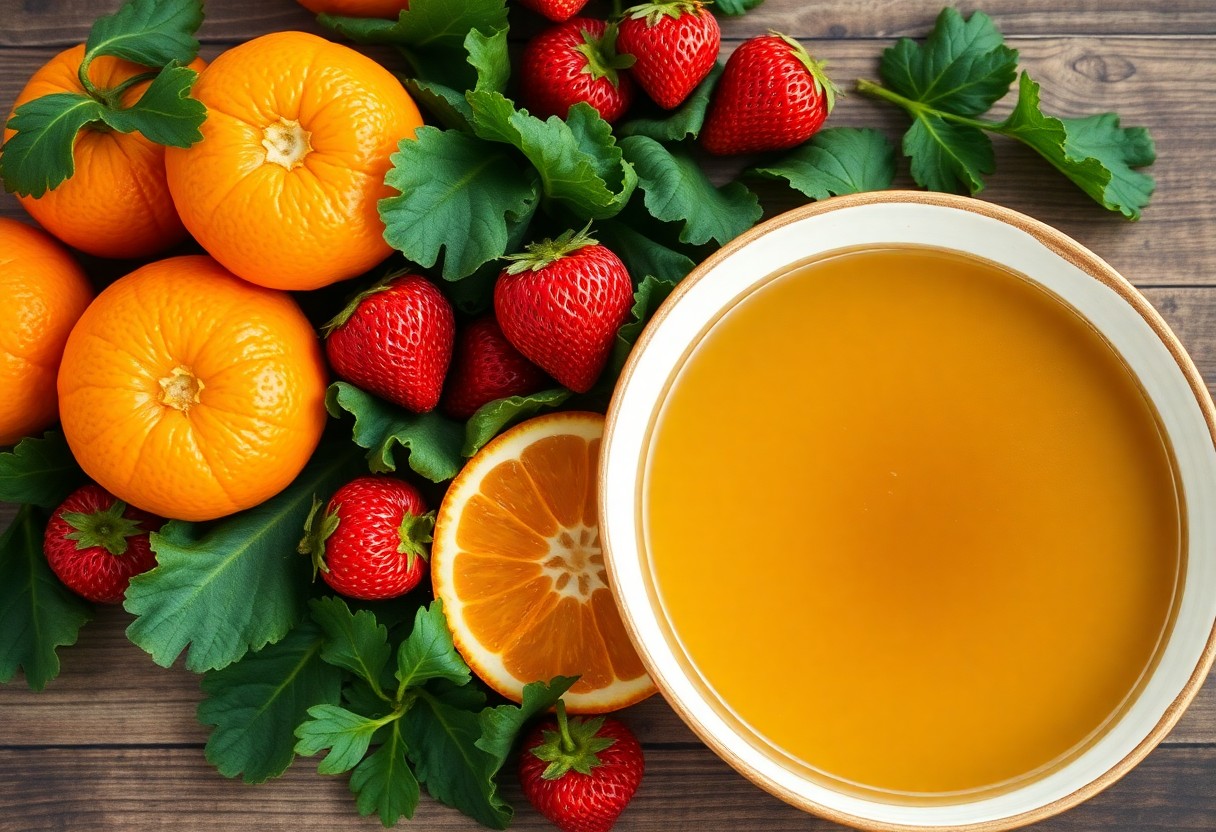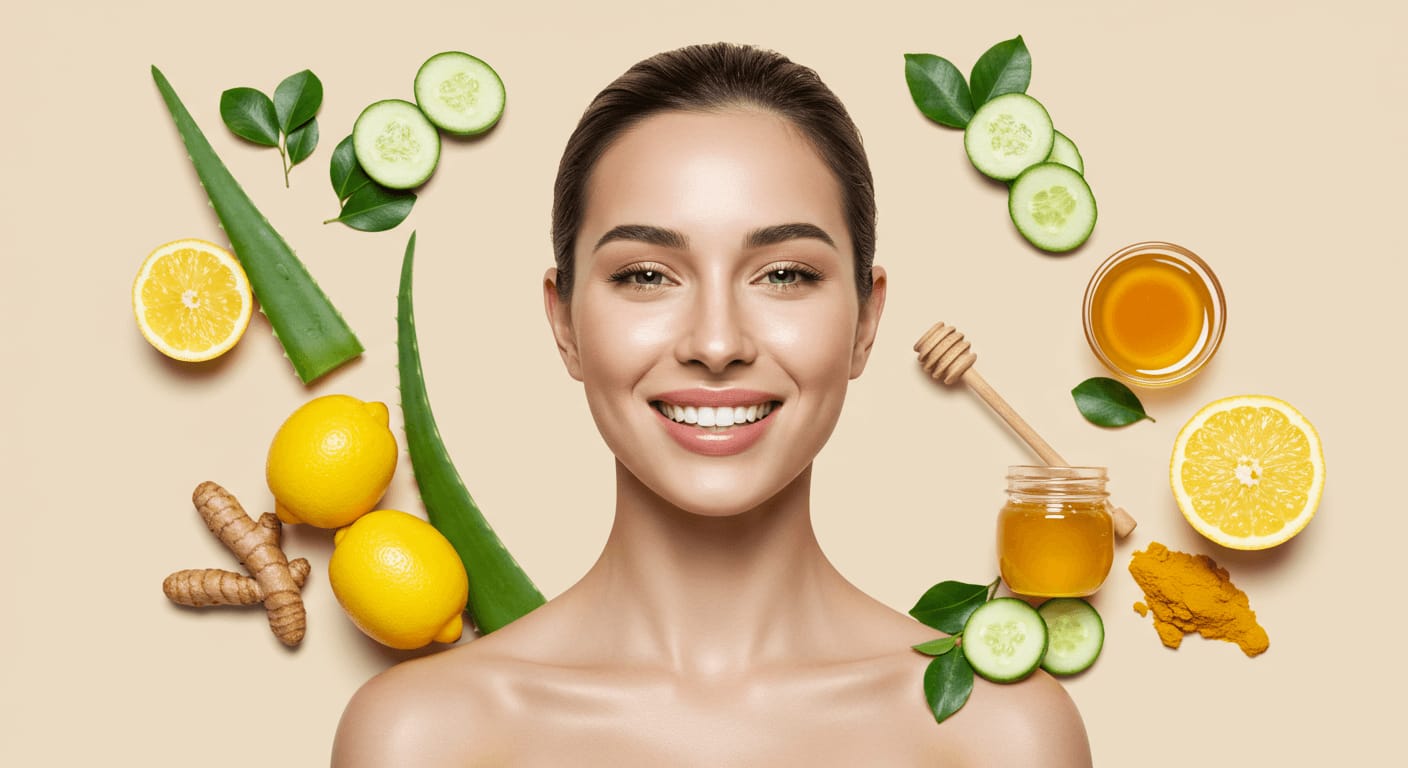Ingredients that enhance your body’s collagen production can significantly improve your skin’s elasticity and overall appearance. In this guide, you will discover the top natural ingredients that can help maintain youthful skin and support joint health while being safe and effective. By incorporating these powerful nutrients into your routine, you can harness their potential to promote skincare from the inside out. Let’s explore how you can elevate your beauty regime and improve your health with these remarkable natural options.
Table of Contents
Key Takeaways: Top Natural Ingredients for Boosting Collagen.
- Vitamin C: Essential for collagen synthesis, it helps stabilize collagen molecules and promotes skin health.
- Bone Broth: A rich source of collagen and amino acids, it supports skin elasticity and joint health.
- Leafy Greens: Packed with chlorophyll, they may enhance collagen production and protect skin from UV damage.
- Omega-3 Fatty Acids: Found in fish and flaxseeds, they help reduce inflammation and support skin hydration.
- Antioxidant-rich Foods: Berries and nuts combat free radicals, protecting collagen fibers and promoting a youthful appearance.
Understanding Collagen
Your body naturally produces collagen, a vital protein that acts as the backbone of your skin, bones, and connective tissues. As you age, your body’s ability to produce collagen decreases, which can lead to visible signs of aging such as sagging skin, wrinkles, and joint discomfort. The understanding of collagen production is crucial for maintaining your overall health and appearance, as it impacts not only your skin elasticity but also the functionality of your joints and organs.
Types of Collagen
Little do many realize that there are several types of collagen in the human body. The most common types of collagen include:
| Type I | Found in skin, tendons, and bones, providing strength. |
| Type II | Primarily located in cartilage, offering support and elasticity. |
| Type III | Often found with Type I, crucial for skin and blood vessels. |
| Type IV | A key component of basal lamina, providing barrier functions. |
| Type V | Found in hair and tissue surfaces, aiding in structure. |
Assume that understanding these types can help you choose the right supplements or treatments for your skin and joint health.
Factors Affecting Collagen Production
The natural decline in collagen production is influenced by several factors, including lifestyle choices and environmental exposure. Your diet, the amount of sun exposure you receive, and even your stress levels can significantly impact how much collagen your body produces. Healthy habits such as proper nutrition and limiting harmful sun exposure can help maintain higher collagen levels, thus enhancing your skin’s appearance and joint health.
- Aging – Your body’s natural decline in collagen over time.
- Diet – Lack of crucial nutrients can hinder collagen formation.
- Sun Exposure – UV rays can break down collagen and elastin.
- Smoking – Tobacco affects blood circulation and collagen synthesis.
- Stress – Higher stress levels can lead to inflammation that negatively impacts collagen.
The key takeaway is that understanding how these factors influence collagen production allows you to take proactive measures in your skincare and health regimen.
With heightened awareness regarding your lifestyle choices, you can promote healthier collagen levels. Simple adjustments such as incorporating collagen-rich foods into your diet, and using sun protection can contribute positively. Additionally, managing stress through meditation or exercise is beneficial for your collagen levels. The balance you achieve contributes significantly to your skin’s youthful appearance and overall well-being.


Top Natural Ingredients
One of the best ways to enhance your skin’s vitality is by incorporating natural ingredients that boost collagen production. These ingredients can help you maintain your skin’s elasticity and retain its youthful appearance. If you’re curious about how to stimulate collagen production, check out this article on 9 ways to stimulate collagen production in skin. You may find several effective strategies that fit seamlessly into your daily routine.
Plant-Based Sources
To maximize your collagen levels, you can turn to plant-based sources that are rich in antioxidants and vitamins necessary for collagen synthesis. Ingredients such as vitamin C and antioxidants found in fruits like oranges, strawberries, and berries play a significant role in promoting collagen formation. Additionally, leafy greens such as spinach and kale, which are high in chlorophyll, can help fight oxidative stress and enhance collagen production in your body.
Animal-Based Sources
Little do many people realize, animal-based sources also provide a potent boost to collagen production. Foods such as chicken skin, fish, and bone broth are packed with collagen, which your body can readily utilize. Bone broth, in particular, is a concentrated source of amino acids that support the repair and replenishment of collagen in your skin, joints, and connective tissues.
PlantBased collagen sources can also include supplements and powders made from various ingredients that can fit into your dietary preferences. While these natural sources can effectively support your health and skin, it’s also wise to consume them as part of a balanced diet. When incorporating animal-based sources, pay attention to sourcing and processing methods, as high-quality options will yield better results for you.
Tips for Incorporating Collagen Boosters into Your Diet
Despite the abundance of collagen supplements available, you can easily enhance your intake of natural collagen boosters through your diet. Including nutrient-rich foods can significantly contribute to collagen production and support overall skin health. Consider incorporating the following collagen-boosting ingredients into your meals:
- Bone broth – a rich source of collagen.
- Citrus fruits – packed with vitamin C to support collagen synthesis.
- Berries – antioxidants that protect collagen from damage.
- Leafy greens – provide chlorophyll, which may increase collagen levels.
- Nuts and seeds – contain zinc and copper, vital for collagen production.
Knowing how to utilize these ingredients effectively can lead to healthier skin and joints. Experiment with different recipes and meal combinations to find what works best for you, enhancing both the flavor and health benefits of your diet.
Dietary Recommendations
While focusing on your daily meals, it’s beneficial to emphasize foods rich in protein, as amino acids like glycine and proline are important for collagen formation. Aim to include options such as chicken, fish, eggs, and plant-based proteins like legumes and quinoa in your diet. Additionally, don’t overlook the significance of vitamin-rich fruits and vegetables, particularly those high in vitamin C, like oranges, strawberries, and bell peppers, to facilitate collagen production.
Moreover, incorporating foods high in antioxidants can combat oxidative stress, which diminishes collagen levels in your skin. Foods such as dark chocolate, green tea, and a variety of colorful fruits and vegetables can help protect your body’s collagen throughout the aging process.
Lifestyle Adjustments
Adjustments in your daily habits can also enhance collagen production. Prioritize a balanced diet, stay hydrated, and embrace healthy lifestyle choices that reduce stress. Minimizing alcohol intake and steering clear of tobacco can prevent collagen degradation, while engaging in regular exercise promotes circulation, benefiting your skin health.
Understanding the impact of your lifestyle choices allows you to make informed decisions for maintaining healthy collagen levels. By focusing on a balanced diet enriched with nutrition, staying physically active, and adopting stress-reducing practices like meditation, you can support your body’s natural collagen production effectively. Small changes can yield significant positive effects, improving not only your skin but your overall well-being.

Step-by-Step Guide to Enhance Collagen Levels
Keep in mind that enhancing your collagen levels is a multifaceted approach that requires consistency and awareness of the natural ingredients that can contribute to this process. Here is a straightforward guide to help you on this journey. For more detailed insights, you can check out these 5 WAYS TO BOOST COLLAGEN NATURALLY that provide practical tips to support your skin’s resilience and overall health.
| Action | Description |
|---|---|
| Hydrating | Incorporate plenty of water to maintain skin hydration, which helps collagen fibers remain intact. |
| Nutritious Diet | Focus on foods rich in vitamins C and E, such as citrus fruits and nuts, that promote collagen synthesis. |
| Sun Protection | Apply sunscreen daily to protect against UV damage, which can degrade collagen levels. |
| Regular Exercise | Engage in activities that increase blood circulation, which can promote nutrient delivery to your skin. |
| Quality Sleep | Ensure adequate rest to aid skin repair and regeneration processes that rely on collagen. |
Daily Regimen
Collagen production greatly benefits from a consistent daily regimen. Start your day with a balanced breakfast rich in natural sources of collagen, such as eggs and leafy greens. Incorporating bone broth into your meals can also deliver high collagen content directly to your body. Additionally, consider consuming fruits and vegetables that are high in antioxidants, which can protect your collagen from oxidative damage.
Throughout your day, hydrate effectively by drinking plenty of water, as hydration is imperative for maintaining skin elasticity and supporting collagen levels. A healthy routine can also include topically applying skincare products that contain ingredients like hyaluronic acid and retinol, which can further stimulate collagen production in your skin.
Supplementation Options
On the flip side, if you find it challenging to consume enough collagen through food alone, you might explore available supplementation options. Many people consider collagen peptides or hydrolyzed collagen as effective ways to enhance their intake. These supplements typically come in powder form and can easily be mixed into smoothies or beverages. Additionally, consult with your healthcare provider before starting any supplementation to ensure that it aligns with your health needs and dietary preferences.
Regimen adherence is vital when it comes to supplementation. You may come across various collagen supplements such as marine, bovine, and porcine types. Each may provide different levels and forms of collagen, so it’s important to research or seek advice about which best suits your lifestyle. Moreover, while most supplements are generally well-tolerated, some may cause digestive discomfort in certain individuals. It’s imperative to monitor how your body responds and make adjustments as needed.
Pros and Cons of Natural Collagen Boosters
Not all natural collagen boosters provide equal benefits, and understanding their pros and cons can help you make informed decisions about your skincare and wellness routine. While many natural ingredients can offer significant advantages, there are also potential drawbacks to consider. Below is a summary of the positives and negatives you might encounter when using these natural boosters.
| Pros | Cons |
|---|---|
| Enhances skin elasticity and hydration | Results may take time to become noticeable |
| Reduces visible signs of aging | Potential allergies to certain ingredients |
| Provides imperative nutrients for skin health | Effects may vary based on individual biology |
| Often more affordable than synthetic options | Not all products are backed by scientific research |
| Incorporates easily into daily routines | Quality can vary between brands |
Benefits of Natural Ingredients
Little-known to many, the use of natural ingredients for boosting collagen can positively impact your skin’s appearance and overall health. Ingredients like vitamin C, hyaluronic acid, and omega fatty acids not only promote collagen production but also work synergistically to maintain skin hydration and resilience. They serve as powerful antioxidants, helping to combat environmental stressors that can accelerate breakdown of collagen in your skin.
Additionally, incorporating these natural ingredients can lead you to a holistic approach to beauty and well-being. You may find that combining certain natural collagen boosters with a balanced diet and proper hydration results in noticeable improvements, making your skin feel firmer and more youthful without the need for invasive procedures or synthetic products.
Potential Drawbacks
Some individuals might experience challenges when relying solely on natural collagen boosters. Although these ingredients are generally safe, they can trigger sensitive reactions in some people, especially if you have existing allergies. The effectiveness of these natural options can vary widely; what works wonderfully for your skin may not be as effective for someone else, leading to frustration if you’re not seeing the expected results.
The variability of results is compounded by the fact that not all products in the market adhere to high manufacturing standards. Inadequate quality control in the sourcing and formulation of these ingredients can lead to products that lack potency or contain unwanted fillers. Therefore, it’s important to conduct proper research, read reviews, and consult skincare professionals before committing to a specific product for boosting collagen. Always look for transparency and quality in the brands you choose, ensuring they comply with safety regulations and provide full ingredient disclosure.
Conclusion
Following this exploration of top natural ingredients for boosting collagen, you can take proactive steps to enhance your skin’s elasticity and overall appearance. Incorporating items such as vitamin C-rich foods, leafy greens, and collagen-boosting herbs into your diet can make a significant difference. These ingredients not only support collagen production but also offer a range of other health benefits. By prioritizing these nutrients, you’re investing in your skin’s long-term vitality.
Additionally, consistently maintaining a balanced lifestyle that includes hydration, proper sun protection, and minimizing stress will further support your collagen levels. As you integrate these natural ingredients and practices into your daily routine, you’ll likely notice improvements in your skin’s texture and firmness over time. Embracing these strategies empowers you to take an active role in nurturing your skin’s health and radiance.
FAQ:
Q: What are some natural ingredients that can help boost collagen production?
A: There are several natural ingredients known to promote collagen synthesis. Key ingredients include vitamin C, which is vital for collagen formation, as well as bone broth, which contains collagen peptides. Other beneficial ingredients include antioxidant-rich foods like berries, leafy greens, and nuts, as well as proteins such as fish and eggs that provide amino acids necessary for collagen production.
Q: How does vitamin C contribute to collagen synthesis?
A: Vitamin C plays a vital role in collagen synthesis by acting as a co-factor for enzymes involved in the stabilization of collagen molecules. It helps in the hydroxylation of proline and lysine amino acids, which are key components of collagen. Additionally, vitamin C is an antioxidant that helps protect collagen from oxidative damage, promoting healthy skin and overall well-being.
Q: Can dietary changes really increase collagen levels in the body?
A: Yes, dietary changes can significantly impact collagen levels. Incorporating foods rich in amino acids, vitamins, and minerals that support collagen production can lead to improved collagen synthesis. A diet high in fruits, vegetables, lean proteins, and healthy fats can encourage the body to produce and maintain collagen more effectively, contributing to better skin elasticity and overall health.
Q: Are there any specific herbs or plants known for boosting collagen?
A: Certain herbs and plants have been studied for their collagen-boosting properties. For example, aloe vera is known for its skin-repairing properties and may promote collagen production. Other herbs such as gotu kola and horsetail are also believed to support collagen synthesis due to their high silica content, which is important for maintaining connective tissues in the body.
Q: How do lifestyle factors affect collagen production?
A: Lifestyle factors such as sun exposure, smoking, and stress can adversely affect collagen production in the body. Excessive sun exposure can lead to collagen damage through UV radiation, while smoking has been shown to reduce blood flow to the skin, impairing collagen synthesis. Additionally, chronic stress can increase cortisol levels, which may also hinder collagen production. Maintaining a healthy lifestyle with proper sun protection, no smoking, and stress management can help support natural collagen levels.

























0 Comments